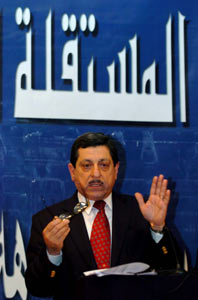
Farid Ayar, spokesman for the Independent Electoral Commission of Iraq,
announces the results of the general elections in Baghdad, capital of Iraq, on
Feb. 13, 2005. The United Iraqi Alliance, backed by Iraq's Shiite leader
Ayatollah Ali al-Sistani, garnered 132 seats of the 275-member National
Assembly, a Kurdish alliance got 71 seats and interim Prime Minister Iyad
Allawi's party had 38 seats. (Photo: Xinhua)
The main Shiite list won 48.1 percent of votes in the Jan. 30 parliamentary
elections, the electoral commission announced on Sunday.
The United Iraqi
Alliance, backed by Iraq's Shiite leader Ayatollah Ali al-Sistani, won 4.075
million votes.
A Kurdish alliance was second with 2.175 million votes, while
1. 168 million votes went to interim Prime Minister Iyad Allawi's
list.
According to calculations based the results, the United Iraqi Alliance
is expected to garner 132 seats in the 275-member National Assembly, and the
Kurdish alliance with 71 seats and Allawi's list with 38 seats.
About 8.55
million Iraqis cast their votes in the elections, about 59 percent of registered
voters, the electoral commission said.
However, turnout in Iraq's Sunni areas
was rather low, as many Sunni Arabs had boycotted the elections or stayed away
out of fear.
In the restive Anbar province, only 3,803 voters cast ballots,
or 2 percent of registered voters, while 29 percent in Salahadin province, the
results showed.
In Nineveh province, which has many Sunni Arabs and Kurds,
turnout was 17 percent.
Right after the official announcement of the results,
interim Iraqi Vice President Ibrahim al-Jaafari, a Shiite leading figure in the
winning list said, "The scene should be complete by participation of the rest of
the Iraqi mosaic in the coming government."
Adnan al-Pachachi, a senior Sunni
politician said, "Now, we have to focus on writing the new constitution by all
Iraqis to prepare for wider elections by the end of the year."
Pachachi's
list, the Independent Democrats Gathering, won only 23,000 votes in the
elections, which means he failed to gain a single seat in the new parliament,
which requires at least 31,000 votes.
"It is clear, from the numbers of the
voters, that most Iraqis in certain areas did not participate in the elections,"
he said, referring to Sunni-dominated cities.
The National Assembly will
choose a transitional government and draft a permanent constitution to pave the
way for a new government and a new parliament to be elected by the end of this
year.



